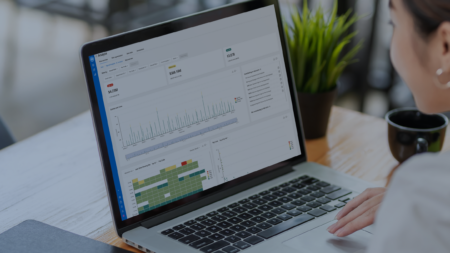The world of finance and accounting is on the verge of a transformation brought on by the rapid adoption of technology in recent years. Automation, cloud computing, and cybersecurity are just a few of the key drivers. And now, a new technology is poised to take center stage: generative AI. In this three-part series, we will explore how generative AI can help finance and accounting professionals, from automating manual processes to improving risk management and providing valuable insights. As with any disruptive technology, there are both opportunities and challenges, and it is crucial for finance and accounting professionals to understand how to leverage generative AI to stay competitive and succeed in the digital age.
Key drivers of technology adoption in finance and accounting
- Increased Automation: Automation is streamlining accounting processes and reducing workloads for finance professionals.
- Use of Cloud Computing: The finance profession widely adopts cloud computing for data storage, access, and analysis. The emergence of FinOps reveals the extent of this adoption.
- Artificial Intelligence: AI is being integrated into finance processes for tasks such as risk detection, predictive analysis, and automating manual processes to review and approve financial transactions.
- Digital Transformation: The finance profession is undergoing a digital transformation with the adoption of technology, leading to improved efficiency and accuracy in financial operations. Producing an income statement for a global organization now requires far fewer certified public accountants.
- Cybersecurity Focus: With the increasing use of technology, there is a growing emphasis on cybersecurity in finance to protect sensitive financial data from cyber threats.
The finance profession is increasingly adopting more technology, resulting in a more efficient, automated, and secure future with greater financial accountability. The 4th industrial revolution is here, with private investments driving its pace, and our profession will greatly benefit from it.
Finance function 4.0: the rise of SMAC technologies and their impact on the industry
As the Finance Function undergoes a significant transformation, we’re entering what some experts, like Anders Liu-Lindberg, call the “Finance Function 4.0” era. This new paradigm emphasizes the increasing use of technology to augment the skills and expertise of finance professionals, leading to more efficient and accurate financial operations. According to a recent McKinsey study, the average Finance leader now spends nearly 20% more of their time on value-add work than they did ten years ago, thanks to the mindful application of technology.
The elements behind all recent successful ventures are fundamental changes in the nature of computing infrastructure, availability, and capacity. These elements culminate in four key technologies often referred to as SMAC – Social, Mobile, Analytics, and Cloud. The first internet dot-com bubble poured billions of dollars into many inventive solutions and technologies, but these did not all translate into real-life innovations delivering substantial business value. However, the survival of companies and technologies, such as Amazon, which is now celebrating its 20th year in existence, demonstrated the power of leveraging SMAC technologies to adapt to a rapidly evolving market and customer preferences.
The impact of investments in SMAC technologies on accounting
Venture Capitalists from Silicon Valley remain strong investors in these technologies today. Until 2011, the predominant investments were made in Social technologies and platforms: Facebook, Myspace, Instagram, Twitter, and others that redefined and played a vital role across all human social interactions, from friendships and awareness to protests in various parts of the world, elections at federal and local levels, and the vast ingestion of ad spend and revenue that organizations and social platforms began to understand.
Investment trends in social technologies and their impact on accounting
In 2011, these investments shifted towards big data and analytics, resulting in great new tools such as ETL and Visualizations that were adopted by the Accounting profession. Tom Hood, in an interview with Neil Amato, emphasized the importance of a CPA’s grounding in understanding the accounting numbers at a deep level, stating that “A CPA can learn finance much better than a finance person can learn accounting…you have to understand where the numbers come from, from a good solid integrity and understanding the reliability of those numbers.”
AI in the 4th industrial revolution: transforming finance and accounting
Most of us don’t realize this, but these massive investments and the 4th industrial revolution already disrupt the F500. In 2006, the top five publicly traded companies by Market Cap were Exxon, Total, GE, Citi, and Microsoft, which was the only technology company in the list of five. As of 2016, we can definitely confirm that data is the new oil, as Apple, Google, Microsoft, Amazon, and Facebook are some of the largest publicly traded companies.
The Canadian connection: pioneering AI research and innovation
In 2017 Artificial Intelligence Investments from leading tech companies and VCs have surged and are delivering great value across all industries thanks to recent ground-breaking new capacities. Artificial Intelligence is not a new term; it was coined in the 1950s, but while the world turned its back on its promises, research and work in this space were continued over decades by a handful of researchers in Canada — backed by the Canadian government and universities — played a significant role in groundwork for today’s global boom in artificial intelligence. This first-mover advantage was quickly followed by massive investments from Microsoft, Google, and other leading tech companies in Canadian startups who are developing innovative solutions across industries from legal to accounting firms and regulators, such as my own venture, MindBridge Ai.
Unsurprisingly, some of the most relevant startups for Digital Disruption for professional services emerged from Canada. Still, it is incredible that this would not have been possible technically only three years ago. For this, we need to acknowledge the tremendous forces and work at play by universities, private investors, and startup ecosystems worldwide who are supporting the creation of such Ai tools and companies. Even the leading institute of certified public accountants have created their own initiatives and embedded data and analytics proficiency as part of the CPA license requirements.
Navigating the disruption: opportunities and challenges for accounting professionals
Many executives and businesses need to be made aware of the full repercussions of automation and how soon it will affect them, especially in the field of management accounting, where machines can do many tasks. The reliable and up-to-date accounting standards have left them unprepared for digital transformation, which could affect their competitiveness in the CPA industry and cost them their clients.
It is vital for accountants to recognize both the speed of the change and the chances and risks it brings so they can stay relevant to their organizations. The development of ChatGPT, which can address various complicated accounting and auditing inquiries, is just the start of what has been termed the future of robo-advisors.
Organizations that adopt a digital-first mindset will have a competitive advantage. They will automate new processes and services, access big data, and use real-time computing to stay ahead of legacy systems. This shift towards digitization will bring new products and services to market, providing potential profits for investors. Much of the financial information available today is hosted on cloud financial management platforms, and the ever-increasing need for managing FinOps is a revealing fact of how long we’ve come in the last decade.
To survive, companies must either disrupt or be disrupted. Ignoring disruptive threats can lead to failure, and acting too slowly can be costly. Embracing digital transformation is necessary to protect and preserve their success, even if it is often started by simple cost optimization initiatives.
If you’re interested in learning more about how generative AI can help your finance or accounting team, reach out to MindBridge today to schedule a demo. With our expertise and cutting-edge AI solutions, we can help your organization stay ahead of the curve and thrive in the rapidly changing landscape of finance and accounting. And remember to stay tuned for the next blog in this series, where we’ll delve deeper into how generative AI is changing the face of finance and accounting.




